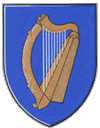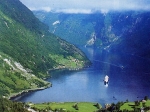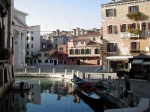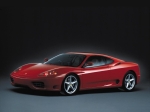
 The Republic of Ireland is a state which covers approximately five-sixths of the island of Ireland , off the coast of north-west Europe . It is the westernmost state of the European Union , and has a developed economy and a population of around four million. The remaining sixth of the island of Ireland is known as Northern Ireland and is part of the United Kingdom of Great Britain and Northern Ireland . Under the Irish constitution the state's official name is simply Ireland . The Republic of Ireland is rather the official 'description' of the state, as defined by law.
The Republic of Ireland is a state which covers approximately five-sixths of the island of Ireland , off the coast of north-west Europe . It is the westernmost state of the European Union , and has a developed economy and a population of around four million. The remaining sixth of the island of Ireland is known as Northern Ireland and is part of the United Kingdom of Great Britain and Northern Ireland . Under the Irish constitution the state's official name is simply Ireland . The Republic of Ireland is rather the official 'description' of the state, as defined by law.
Geography
The island of Ireland extends over 84,421 km² of which five-sixths belong to the Republic, with the remainder constituting Northern Ireland. It is bound to the west by the Atlantic Ocean , to the northeast by the North Channel . To the east is found the Irish Sea which reconnects to the ocean via the southwest with St. George's Channel and the Celtic Sea . The west-coast of Ireland mostly consists of cliffs, hills and low mountains (the highest point being Carrauntoohil at 1,041 m). In from the perimeter of the country is mostly relatively flat farmland, traversed by rivers such as the River Shannon and several large lakes or loughs . The center of the country is part of the River Shannon watershed, containing large areas of bogland , used for peat production.
The local temperate climate is modified by the North Atlantic Current and is relatively mild. Summers are rarely very hot, but it freezes only occasionally in winter. Precipitation is very common, with up to 275 days with rain in some parts of the country. Chief cities are the capital Dublin on the east coast, Cork in the south, Galway and Limerick on the west coast, and Waterford on the south east coast (see Cities in Ireland ).
Economy
The Republic of Ireland is a small, modern, trade-dependent economy with growth averaging a robust 10% in 1995 - 2000 . Agriculture , once the most important sector, is now dwarfed by industry , which accounts for 38% of GDP , about 80% of exports, and employs 28% of the labour force. Although exports remain the primary engine for the state's robust growth, the economy is also benefiting from a rise in consumer spending and recovery in both construction and business investment. On paper, the Republic is the largest exporter of software-related goods and services in the world. In fact, a lot of foreign software, and sometimes music, is filtered through the Republic to avail of the state's non-taxing of royalties from copyrighted goods.
Over the past decade, the Irish government has implemented a series of national economic programmes designed to curb inflation , ease tax burdens, reduce government spending as a percentage of GDP , increase labour force skills, and promote foreign investment. The state joined in launching the euro currency system in January 1999 (leaving behind the Irish pound ) along with ten other EU nations. This period of high economic growth led many to call the Republic the Celtic Tiger . The economy felt the impact of the global economic slowdown in 2001 , particularly in the high-tech export sector – the growth rate in that area was cut by nearly half. GDP growth continued to be relatively robust, with a rate of about 6% in 2001 and 2002 – but this was expected to fall to around 2% in 2003. Since 2001, GNP growth has been much worse, with an almost three-fold decrease in 2001 from the previous year. After a near stagnant year in 2002, growth picked up in 2003. Growth for 2004 was over 4% and it is expected to be 5% or higher for 2005. It has the 4th highest GDP per capita in the world after Luxembourg, Norway, and the U.S.A. thus, making it an incredibly wealthy nation.
Demographics
Most Irish people are of Celtic ethnicity, though there is a sizable English minority. The official languages are Irish (Gaeilge), the native Celtic language , and English , which is constitutionally described as a secondary official language. Learning Irish is compulsory in education, but English is by far the predominant language. Public signs are usually bilingual and national media in Irish also exist. People living in predominantly Irish speaking communities (the Gaeltacht ) are limited to the low tens of thousands in isolated pockets largely on the western seaboard.
The Republic of Ireland is 92% Roman Catholic ; however, there has been a massive decline in full adherence among Irish Catholics. Between 1996 and 2001 , regular Mass attendance, already previously in decline, declined from 60% to 48% (it had been 90%+ in 1973 ), and all but two of its seminaries have either closed or are expected to close soon. The Church was also hit in the 1990s by a series of sexual scandals and cover-up charges against its hierarchy. In 1995, after an almost 60-year ban, voters chose, by a margin of less than 1%, to re-legalize divorce in the Republic.
The second largest religion, the Church of Ireland ( Anglican ), having been in decline for most of the twentieth century, has now experienced an increase in membership, according to the 2002 census, as have other small Christian denominations and Islam . However, the very small Jewish community in the state has continued to decline in numbers.




